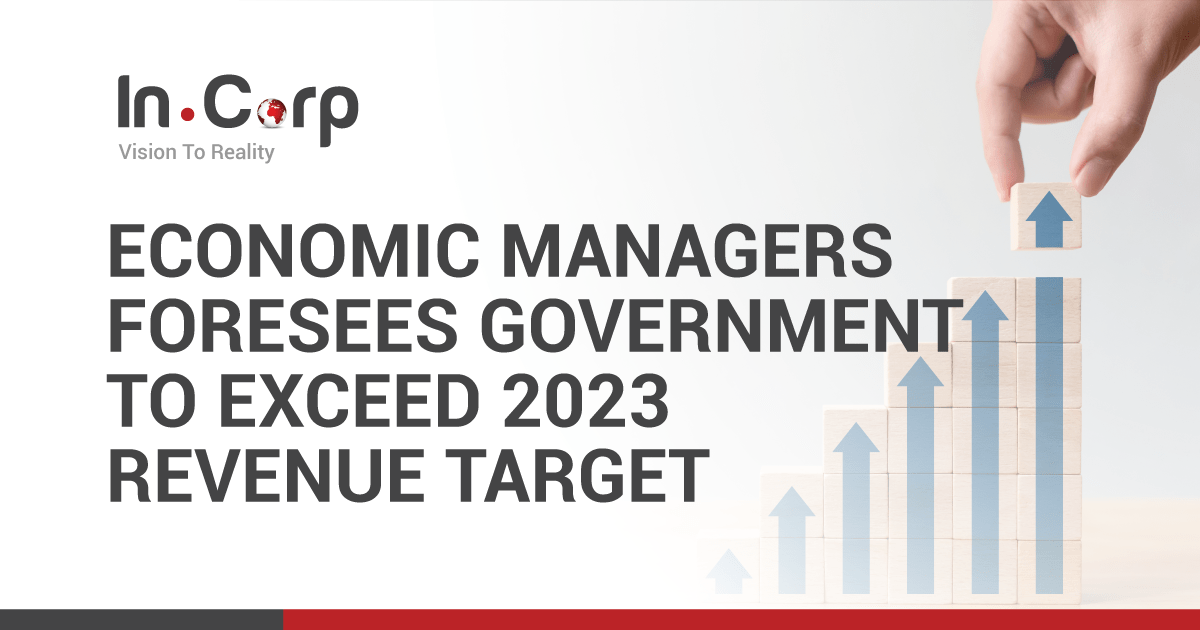
Economic Managers Foresees Government to Exceed 2023 Revenue Target
The current administration’s economic managers anticipate that government revenue collections will exceed the target this year, owing to steps to improve tax administration and collection efficiency.
The Development Budget Coordination Committee (DBCC) announced in a statement following a special coordination committee meeting on Friday that the “emerging total revenue collection for 2023 is estimated to be ₱3.84 trillion to ₱3.90 trillion.”
The projected revenue collection for the year exceeded the ₱3.73 trillion target set earlier by the DBCC.
The economic managers set the revenue target for this year at ₱3.73 trillion, ₱4.184 trillion in 2024, ₱4.692 trillion in 2025, ₱5.255 trillion in 2026, ₱5.895 trillion in 2027, and ₱6.621 trillion in 2028 in April.
The Budget Chief chairs the DBCC, which is made up of the secretaries of the National Economic and Development Authority (NEDA), the Department of Finance (DOF), and the governor of the Bangko Sentral ng Pilipinas (BSP).
Similarly, the DBCC anticipates tax receipts of ₱3.50 trillion to ₱3.55 trillion, exceeding the objective by around 15%.
The above-target revenue projection arose from higher actual collections in the first nine months of 2023, which reached ₱2.84 trillion, up 6.8% year on year and exceeding the period’s target by 3%.
This is because tax and non-tax revenues increased by 6.4% and 10.5%, respectively, “due to increased collections from the Bureau of Customs (BOC) and non-tax revenues of ₱152.57 billion.”
According to the DBCC, the Bureau of Internal Revenue (BIR) and the Bureau of Customs (BOC) are pursuing many changes to better tax administration and increase revenue collection, such as digitization projects aimed at eliminating corruption, increasing transparency, and making tax payments more manageable.
Furthermore, the economic managers stated that they would work closely with Congress to ensure the adoption of the previous administration’s remaining tax reforms on passive income and financial intermediaries taxes, as well as additional tax measures.
The DBCC noted, “These include the excise tax on single-use plastics (SUPs), rationalization of the mining fiscal regime, motor-vehicle road users’ tax, excise tax on sweetened beverages and junk foods, tax on pre-mixed alcohol, value-added tax (VAT) on digital service providers, carbon taxation, capital market development bill, and the military and uniformed personnel (MUP) pension reform bill.”
Furthermore, the national government’s payout rate increased dramatically from 93.4% in June 2023 to 98.9% in September.
The economists mentioned, “This was mainly driven by the robust disbursement in the third quarter, reaching P3.82 trillion as of the end of September.”
According to the DBCC, due to the “successful submission of agencies’ catch-up plans, government spending is expected to further improve during the fourth quarter.”
The economic managers cited, “This will be mainly driven by accelerated implementation of programs on infrastructure, transport, labor and employment, social protection, and education, among others.”
According to the DBCC, the Department of Budget and Management (DBM) will continue to work closely with agencies, particularly those with poor budget utilization rates, through frequent meetings focused on expenditure performance and catch-up strategies.
The DBCC noted, “Moving forward, the DBCC shall address procurement bottlenecks by strictly directing the conduct of Early Procurement Activities (EPA) among government agencies by next year.”
The DBCC added, “This shall enable timely procurement planning by having procurement activities already conducted as early as the submission of the National Expenditure Program (NEP) to Congress.”
As mentioned by the DBCC, The Budget and Treasury Management System (BTMS), which is part of the Integrated Financial Management Information System (IFMIS), will be deployed by 2024.
According to the DBCC’s statement, “This shall address major procurement bottlenecks such as the late submission of billings from suppliers and creditors and delays in the delivery of goods and services by providers within the time frame.”
The DBCC stated that it would encourage all government agencies, including State Universities and Colleges (SUCs), Government-Owned and Controlled Corporations (GOCCs), and Local Government Units (LGUs), to use safe and efficient digital payments for goods and services, which includes the distribution of financial assistance, in accordance with Executive Order No. 170, s. 2022.
The economic managers noted, “Given the better-than-expected revenue and spending performance, the DBCC maintains optimism in its outlook that growth and fiscal targets set under the Medium-Term Fiscal Program can be achieved.”

